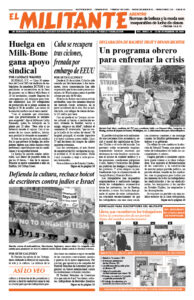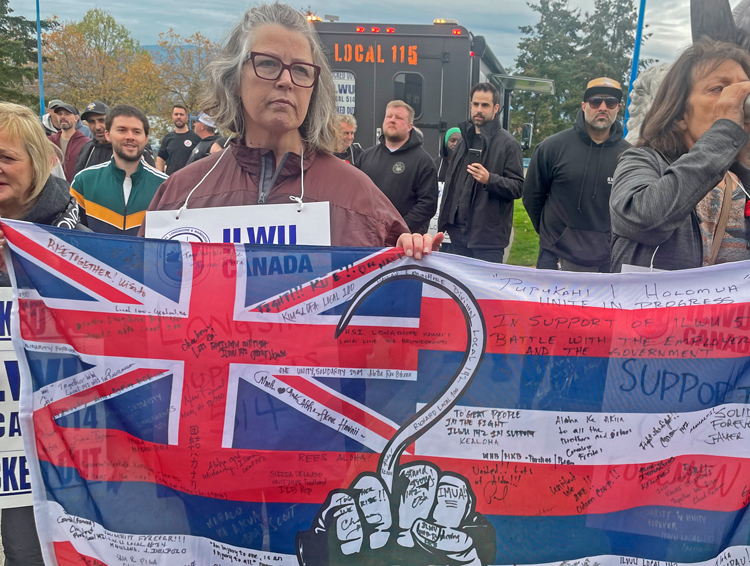MONTREAL — Within days of the port bosses locking out some 1,900 unionized longshore workers in British Columbia and Quebec, the government responded to cries by boss associations across the country to act and stepped in Nov. 12, ordering the workers back to work.
“We simply cannot afford this uncertainty and instability,” Labour Minister Steven MacKinnon said. He announced that he had instructed the Canada Industrial Relations Board to impose “final and binding arbitration.” The port workers are fighting to win contracts with adequate wages, safe working conditions, schedules that allow for a family life and against job cuts.
The Nov. 10 lockout at the Port of Montreal, the country’s second largest port, came after the Maritime Employers Association delivered its “final” proposal Nov. 7 that addressed none of the workers’ concerns. Over 90% of Canadian Union of Public Employees Local 375 members voted to reject the offer, by 99.7%. The workers had held strike actions at two of the main terminals at the port Oct. 31 and refused to do overtime. Their contract ended last December.
“It’s a dark day for the rights of workers. The right to bargain collectively is a constitutional right and is not negotiable,” the Canadian Union of Public Employees said. It’s “mind-boggling, as the employer locked out employees last Sunday night and immediately requested government intervention without actually bargaining.”
On Nov. 4 the British Columbia Maritime Employers Association locked out over 700 unionized foremen, who function as lead hands and are members of Local 514 of the International Longshore and Warehouse Union. The bosses’ action shut down almost all of Canada’s West Coast port system, through which $800 million in goods pass each day. That lockout followed a strike notice by Local 514 and a decision by union members to refuse all overtime. Their old contract expired March 31, 2023.
“We will fight this order in the courts. We will fight the arbitrated forced contract in the courts,” Frank Morena, president of Local 514, told the press.
Over 500 members of ILWU Local 514 and their supporters had rallied at the Vancouver docks Nov. 8. Members of the Canadian Union of Postal Workers, ILWU Local 500, the International Union of Operating Engineers, and the International Association of Machinists and Aerospace Workers joined in solidarity. Two ILWU Local 500 members held a flag signed by longshore workers in Hawaii and Japan in solidarity with the fight.
“Our 300 members of IAMAW Local 11, aerospace workers bring warmest solidarity greetings in your fight for a decent contract,” said a Nov. 7 letter from workers at Delta Aerospace near Vancouver. The message called the bosses’ efforts to force federal government intervention “an attack against collective bargaining rights of all workers in Canada.”
Bosses demanded Ottawa act
In 2021, under the Liberal Party government of Prime Minister Justin Trudeau, Parliament passed a strikebreaking law ordering Montreal dockworkers back to work under compulsory arbitration.
More than 100 employer organizations, including the Canadian Chamber of Commerce, signed an Oct. 31 open letter to the Trudeau government. It called on Ottawa to do whatever it takes to end the work stoppage, claiming, “We simply cannot afford another strike in the transportation sector.”
This referred to the August three-day shutdown of Canada’s two main freight transportation railroads, Canadian National and Canadian Pacific Kansas City, in a strike and lockout that involved 10,000 Teamsters union rail workers fighting for safer working conditions. The Canada Industrial Relations Board ordered them back to work and imposed binding arbitration.
Teamsters Canada denounced the government’s attack on the dockworkers, saying the minister’s decision goes against Charter rights. “Unions will fight this to the end,” said Teamsters Canada National President Francois Laporte in a statement.”
“It’s the same battle that we are waging, for better working conditions and humane schedules,” Montreal CN conductor Mychael Parsons told the Militant Nov. 6. “The companies make record profits off our backs. There is no reason why our working conditions must be so atrocious.” Parsons is one of a number of Canadian National conductors who made solidarity visits to Local 375 picket lines in Montreal.
Ned Dmytryshyn in Vancouver and Philippe Tessier in Montreal contributed to this article.


